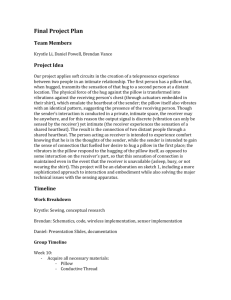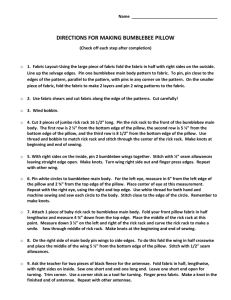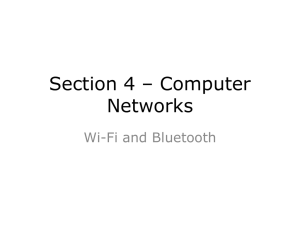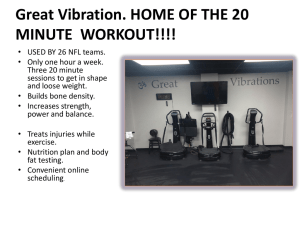Final Project Presentation
advertisement
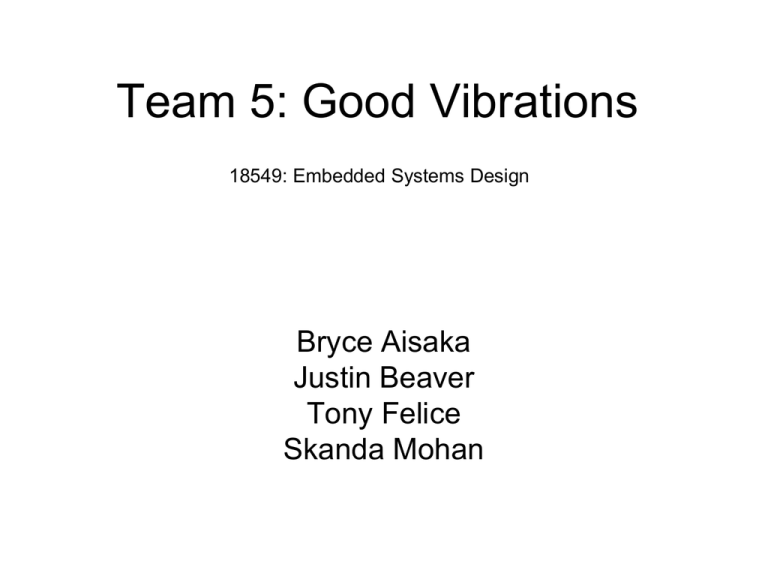
Team 5: Good Vibrations 18549: Embedded Systems Design Bryce Aisaka Justin Beaver Tony Felice Skanda Mohan Team Members Bryce Aisaka Justin Beaver Tony Felice Skanda Mohan baisaka@andrew.cmu.edu justinbeaver8@gmail.com romman0012003@gmail.com skandam@andrew.cmu.edu http://www.ece.cmu.edu/~ece549/spring10/team5/index.html Concept • A silent, portable, comfortable, batteryoperated, phone activated, vibrating pillow cover • User sets time to wake up via phone UI, pillow vibrates at that time to wake user • Competitive Advantages: – Portability: Just need to carry your cell phone and our pillow cover – Customizable: Can use our pillow cover with the pillow of your choice Goals • Silent: Should not wake up anyone else • Portable • Battery Operated: Does not need to be plugged in during usage • Phone activated: Can use the cell phone that you already own to activate the pillow vibration • Customizable • Fail-Safe: Sound is emitted only if person does not wake up after set time limit • Effective: Needs to be able to wake someone up Architecture Serial port Bluetooth module Arduino Nano Bluetooth enabled Android phone Solarbotics VPM2 Vibrating Disk Motor 3x Triple A’s Components Solarbotics VPM2 Vibrating Disk Motor Padding +Covers Arduino Nano +Bluetooth module (BlueSmirf Gold) Battery Holder +AAAs Bluetooth Enabled Smart-Phone (Motorola Droid) User Interface Experimentation Campaign • Bluetooth Range – Method: Stand at a certain distance and measure the time it takes for the BT connection to be established and a byte to travel round trip – Took 30 measurements at increments of 5 feet to ensure reproducible results • Idle Power Consumption – Method: Leave all components of the system running in idle state, measure how long it takes for batteries to run out • Continuous Power Consumption – Method: Leave the vibration motors continuously running, measure how long it takes for batteries to run out. Experimentation Campaign (cont.’d) • User Survey – Method: Ask 10 test users to use our product and answer a series of questions – Questions address comfort of pillow, willingness to adopt our product, and pricing of a mass-produced version of our product Experimental Results • Bluetooth range test results • Idle Power Consumption: ~24 hours • Continuous Power Consumption: >65 minutes Experimental Results (cont.’d) • Number of users who said… – – – – – – The pillow was comfortable while handling it: 9/10 The pillow was comfortable while lying on it: 10/10 They would wake up from the high vibration setting: 9/10 They would wake up from the medium vibration setting: 8/10 They would wake up from the low vibration setting: 2/10 They would prefer our product to how they currently wake up: 6/10 • Of the people who said they prefer our product, the number of users who said… – They would be willing to charge the pillow as often as they charge their cell phone: 4/6 – They would be willing to pay up to $20 for our product: 6/6 – They would be willing to pay up to $30 for our product: 2/6 – They would be willing to pay more than $30 for our product: 1/6 Insights from Measurements • Battery life is sufficient, but daily recharging may be required • Bluetooth range is long enough for typical bedroom use • Our comfort and effectiveness requirements seem to have been met • Users seem reluctant to break habits and switch to a newer, novel way to wake up • The target price is $20 Open Issues • Longer battery life • A 5V power solution for more powerful vibration • Sensors on pillow cover • Making the pillow cover washable Conclusions • Some things we learned: – Arduino has much more computing power than we actually need, but is really convenient – Bluetooth is surprisingly easy to use, once you find the proper UUID • What we accomplished: – Building a finished product • What we would do differently: – Order parts earlier
